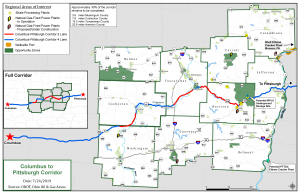Columbus to Pittsburgh Corridor Feasibility Study
This project will determine the economic benefits of finishing the four-lane corridor between Columbus, Ohio and Pittsburgh, Pennsylvania. This corridor is 70% complete, requiring only 47 miles to be upgraded from two to four lanes. This corridor traverses through the heart of the Marcellus & Utica Shale formations in eastern Appalachian region of Ohio and is bookended by two growing metropolitan regions. This area, part of a larger tri-state region has seen over $80 billion in investments since 2013 and has propelled the United States towards energy independence and a second petrochemical hub. Completion of this corridor will also facilitate the expansion of the steel, food processing, and other manufacturing facilities as well as the logistics and tourism sectors of the region’s economy. This project will strengthen the region’s economic competitiveness and facilitate the transportation of raw materials and finished goods for such industry leaders as Wal-Mart (distribution center in Jefferson County), JSW Steel, Kraft-Heinz, and Fanatics.
Completion of this project will allow further environmental and right of way acquisition to take place, leading to construction by the end of the decade. The corridor faces numerous safety issues, due to the number and severity of crashes in this primarily rural area. The Columbus to Pittsburgh Corridor includes US 250 which is on the Statewide Transportation System (STS) network and is critical to trucking and freight movement within Ohio.
This project is also critical to protect a regional drinking water source. Tappan Lake, which is part of the Muskingum Watershed Conservancy District (MWCD) is bisected by US 250 and is a primary source of drinking water for the Village of Cadiz. Tappan Lake also serves as a drinking water source for the newly constructed $5 million Tappan Lake Marina, which is a regional recreational and dining destination. With the ever-increasing traffic count especially trucks, in this stretch of highway, MWCD is concerned that an accident and/or spill due to congestion will cause a serious impact to the lake, affecting the drinking water supply and the recreating public. Planning for ways to lower this possibility is a very important component of this project.
The elimination of a 70-mile detour for oversized loads (due to a substandard railroad bridge along the corridor) will reduce emissions and spur additional economic growth by increasing the number of available sites for prospective employers seeking to move into the region that require access to a four-lane highway. This corridor will also function as a relief valve for Interstate 70 to the south, increasing the resiliency of the region to respond to unforeseen events that often lead to complete closure of sections of I-70 in Belmont, Guernsey, and Muskingum Counties leading to long detours and delays in the deliveries of raw materials, supplies, and finished goods. Sections of I-70 also flood near Buckeye Lake forcing closure of the interstate and these flood events seem to be incurring more frequently. This corridor will provide a viable alternative for the transportation of goods and materials as well as the traveling public. Current detour routes are inadequate for long-term redirection of heavy traffic. By 2040, sections of I-70 are projected to be at or near capacity with the level of service degraded to a rating of E or F. Completion of the Columbus to Pittsburgh Corridor will allow for efficient delivery of goods, reduce travel costs, improve safety, and allow the region to be more economically competitive by increasing access to a four-lane highway. Completion of the corridor is an essential component for the Appalachian Energy and Petrochemical Renaissance as documented in the study completed by the US Department of Energy in June 2020, “The Appalachian Energy and Petrochemical Renaissance, An Examination of Economic Progress and Opportunities.”
Questions/Comments?
Kevin Buettner, AICP, LEED AP, CNU-A
Transportation Director
740-439-4471 ext. 212
Additional Information
US Dept. of Energy, The Appalachian Energy and Petrochemical Renaissance, June 2020
Fact Sheet, Columbus to Pittsburgh Corridor Association
